Papers by Hon. Gregory Parker, Ph.D.
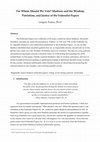
Political Theory: Political Philosophy eJournal, 2024
The Federalist Papers are a collection of 85 essays written by James Madison, Alexander Hamilton,... more The Federalist Papers are a collection of 85 essays written by James Madison, Alexander Hamilton, and John Jay under the pseudonym "Publius" in 1787 and 1788. In the Federalist No. 10, arguably Madison's most influential contribution to the Federalist Papers, we can see that Madison identified three essential qualities that we, as responsible citizens, should look for in the person who wants our vote: Wisdom, Patriotism, and Love of Justice. The idea of a wise, patriotic, and justice-loving leader remains a necessity today as it did during the Founding Era of the United States. In this paper, I briefly examine Madison's idea of wisdom, patriotism, and love of justice in political decision-making or applying knowledge to determine the best course of action for the country. Madison's philosophy offers timeless lessons on discerning and protecting the national interest in our complex, ever-evolving republic society.
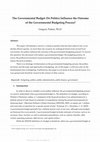
Political Economy: Budget, Deficit, & Debt eJournal, 2023
This paper will attempt to answer a common question that has been asked of me, in my elected offi... more This paper will attempt to answer a common question that has been asked of me, in my elected official capacity, on more than one occasion, by undergrad interns from several local universities. Do politics influence the outcome of the governmental budgeting process? To answer this question, this document will explore a governmental budget, the budgeting process, its actors, the political environment of governmental budgeting, and some recommendations to reduce the level of politics. There is no shortage of information on the governmental budgeting process, the politics involved, and the types and approaches to budgeting, yet; in this paper, I will focus only on the fundamental form of budgeting. Furthermore, this paper is not meant to be an end-all source. It is very general and should be viewed in the context of other sources.
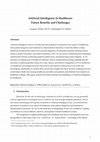
Digital Health eJournal, 2023
Artificial Intelligence (AI) is a tool that has the potential to transform every aspect of health... more Artificial Intelligence (AI) is a tool that has the potential to transform every aspect of healthcare, from patient diagnosis and treatment to administrative functions. AI has the ability to help healthcare professionals make more accurate diagnoses, develop personalized treatment plans, improve patient outcomes, and reduce healthcare costs. AI can assist in identifying and mitigating cybersecurity threats, protecting sensitive patient data, and preserving system integrity. As AI becomes an integral part of healthcare delivery, ethical considerations emerge, highlighting the necessity of addressing these issues for a safe, ethical, and effective integration of AI in healthcare. As healthcare increasingly becomes data-driven, the threats to data privacy are on the rise. Developing 'explainable AI' models that can provide insights into their decision-making processes could help to build trust among healthcare providers and patients and facilitate their adoption in healthcare settings. This paper explores the future benefits and challenges of Artificial Intelligence in Healthcare.
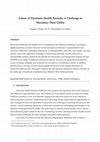
Health Communication eJournal, 2023
Electronic Health Records (EHRs) have revolutionized the healthcare landscape, providing a digita... more Electronic Health Records (EHRs) have revolutionized the healthcare landscape, providing a digital repository of patient data that can be analyzed and utilized in unprecedented ways. However, EHRs have challenges, particularly in interoperability, data silos, data quality, and data privacy. One of the significant challenges in maximizing the utility of EHR is the lack of interoperable systems, defined by the Healthcare Information and Management Systems Society (HIMSS) as the ability of different information systems, devices, and applications (systems) to access, exchange, integrate, and cooperatively use data in a coordinated manner. In addition, patient privacy and data security remain significant barriers to the optimal utilization of electronic health records. This paper examines the role electronic healthcare records will have on the landscape of healthcare if optimized and utilized to their fullest potential.
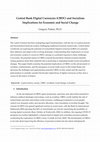
Social and Political Philosophy eJournal, 2023
The world of finance has been undergoing rapid transformation, with the rise of cryptocurrencies ... more The world of finance has been undergoing rapid transformation, with the rise of cryptocurrencies and decentralized financial systems challenging traditional monetary frameworks. Central banks worldwide are exploring the potential of Central Bank Digital Currencies (CBDCs) to maintain their influence and adapt to this evolving landscape. Understanding their implications on social and economic systems is crucial as CBDCs emerge as a potential response to these challenges.
The concept of CBDCs has gained significant traction in recent years, with the Bank for International Settlements (BIS) reporting that 86% of central banks are actively researching the possibility of issuing digital currencies (Boar, Holden, & Wadsworth, 2020). In addition, the ongoing COVID-19 pandemic has further highlighted a claimed need for digital and contactless payment methods, accelerating the exploration of CBDCs (Auer, Cornelli, & Frost, 2020). The development of CBDCs is not only about improving the efficiency of payment systems but also about reshaping the monetary and financial landscape. Mancini-Griffoli et al. (2018) argue that CBDCs could play a pivotal role in addressing the limitations of the current financial system, such as slow cross-border payments, limited financial inclusion, and the risks associated with bank runs. Conversely, the potential impact of CBDCs extends beyond these claimed economic benefits, raising questions about their potential role in promoting or impeding broader social and political changes.
In this article, I will briefly examine the potential implications of CBDCs on the advancement of socialism, totalitarianism, and the emergence of social credit scores. I will also discuss the challenges and opportunities posed by CBDCs in this context and the need for policymakers to carefully consider the broader implications of digital currencies as they chart a course for the future of finance.
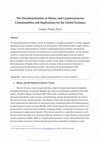
Monetary Economics: Financial System and Institutions eJournal, 2023
The Denationalization of Money, a book by NobelPrize–winning economist F.A. Hayek, suggests aboli... more The Denationalization of Money, a book by NobelPrize–winning economist F.A. Hayek, suggests abolishing the government's monopoly over fiat currency. Hayek believed that a single national currency and the central bank have a history of generating massive inflation and; therefore, unregulated private currencies can counteract such a governmental monopoly over the national currency. Cryptocurrencies (cryptocurrencies) are decentralized digital currencies built on blockchain technology that has the potential to reshape the global financial landscape and foster a more competitive and innovative monetary system. In this article, I examine some commonalities and implications of Hayek's theory on the role of money in the economy for the future of cryptocurrencies and the financial system. I also discuss the potential impact of the denationalization of money and cryptocurrencies on the global economic system.
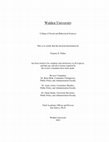
Walden University, 2022
The novel coronavirus, also known as Severe Acute Respiratory Syndrome Coronavirus 2 and causing ... more The novel coronavirus, also known as Severe Acute Respiratory Syndrome Coronavirus 2 and causing a disease called COVID-19, reached the United States in January 2020. In the United States, some state and local governments-imposed lockdowns on citizens and businesses in the name of public safety and health, while other governments prioritized avoiding disruptions to economic activity in their states and localities. The purpose of this qualitative case study was to explore the factors that influenced the State of Texas’s policies toward business activity during the COVID-19 pandemic. Guided by the theory of regime values, a nonintrusive approach was employed to thematically analyze a condensed sample size of official court case records, government documents, official meetings, press conferences, and interview transcripts to answer the research question. An analysis of these documents revealed three central themes: prioritizing public health and safety, the constitutionality of the executive orders, and the executive orders were informed by the national government and health experts. Overall, this study suggests Texas policymakers prioritized the health and safety of citizens as one factor that influenced policies towards business activity during the COVID-19 pandemic. Furthermore, this study also suggests the federal government and health experts were an influential factor in Texas’s initial response to the COVID-19 pandemic. Open debate and discussion around the need for updated emergency management approaches that protect property rights and protecting public health were recommendations found to benefit society at large which may result in positive social change.
Parker Press, 2020
I was engaged in a pleasant conversation with a friend, and upon a pause, my friend blurted out, ... more I was engaged in a pleasant conversation with a friend, and upon a pause, my friend blurted out, "how do these awful politicians get to where they are? How do all the worst people rise to the top in politics? Now, the truth be told, my first instinct was to offer a quick response, but I thought it would be prudent to reflect on the question before a hasty answer. While there is extensive research on the topic of ethics in politics, the focus of this article is on answering just the burning question noted above. It is also worth mentioning that the factors identified here are not a complete list and are in no particular order. Moreover, all identified factors are not required for the most diabolical people to rise to power.
Parker Press, 2020
In my book Conservative Essays for the Modern Era, I introduced the term collective security and ... more In my book Conservative Essays for the Modern Era, I introduced the term collective security and or collective safety. Many readers requested a further examination of collective security in the context of that writing. Therefore, given the current situation, it is prudent to provide a brief examination of collective security and individual freedom. It is worth noting that the terms collective security or collective safety are used interchangeably within the context of this writing.











Uploads
Papers by Hon. Gregory Parker, Ph.D.
The concept of CBDCs has gained significant traction in recent years, with the Bank for International Settlements (BIS) reporting that 86% of central banks are actively researching the possibility of issuing digital currencies (Boar, Holden, & Wadsworth, 2020). In addition, the ongoing COVID-19 pandemic has further highlighted a claimed need for digital and contactless payment methods, accelerating the exploration of CBDCs (Auer, Cornelli, & Frost, 2020). The development of CBDCs is not only about improving the efficiency of payment systems but also about reshaping the monetary and financial landscape. Mancini-Griffoli et al. (2018) argue that CBDCs could play a pivotal role in addressing the limitations of the current financial system, such as slow cross-border payments, limited financial inclusion, and the risks associated with bank runs. Conversely, the potential impact of CBDCs extends beyond these claimed economic benefits, raising questions about their potential role in promoting or impeding broader social and political changes.
In this article, I will briefly examine the potential implications of CBDCs on the advancement of socialism, totalitarianism, and the emergence of social credit scores. I will also discuss the challenges and opportunities posed by CBDCs in this context and the need for policymakers to carefully consider the broader implications of digital currencies as they chart a course for the future of finance.
The concept of CBDCs has gained significant traction in recent years, with the Bank for International Settlements (BIS) reporting that 86% of central banks are actively researching the possibility of issuing digital currencies (Boar, Holden, & Wadsworth, 2020). In addition, the ongoing COVID-19 pandemic has further highlighted a claimed need for digital and contactless payment methods, accelerating the exploration of CBDCs (Auer, Cornelli, & Frost, 2020). The development of CBDCs is not only about improving the efficiency of payment systems but also about reshaping the monetary and financial landscape. Mancini-Griffoli et al. (2018) argue that CBDCs could play a pivotal role in addressing the limitations of the current financial system, such as slow cross-border payments, limited financial inclusion, and the risks associated with bank runs. Conversely, the potential impact of CBDCs extends beyond these claimed economic benefits, raising questions about their potential role in promoting or impeding broader social and political changes.
In this article, I will briefly examine the potential implications of CBDCs on the advancement of socialism, totalitarianism, and the emergence of social credit scores. I will also discuss the challenges and opportunities posed by CBDCs in this context and the need for policymakers to carefully consider the broader implications of digital currencies as they chart a course for the future of finance.